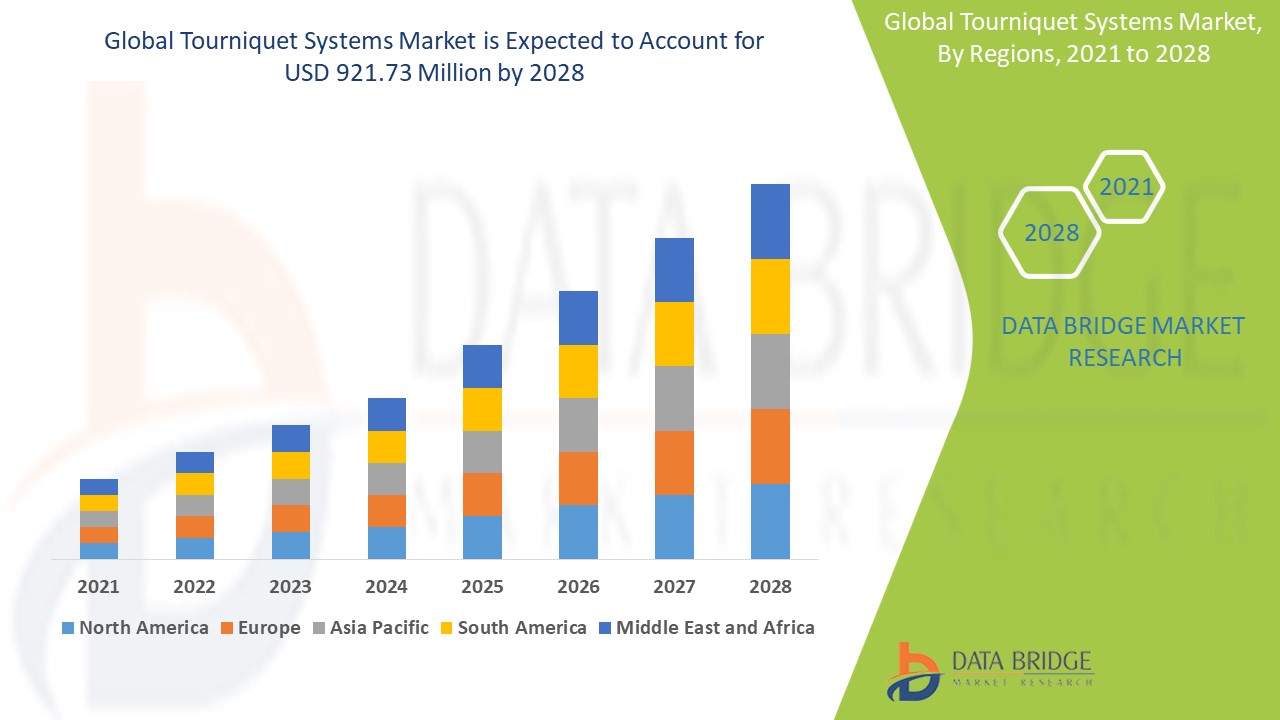Global Tourniquet Systems Market
市场规模(十亿美元)
CAGR :
% 
 USD
329.80 Million
USD
537.28 Million
2023
2031
USD
329.80 Million
USD
537.28 Million
2023
2031
| 2024 –2031 | |
| USD 329.80 Million | |
| USD 537.28 Million | |
|
|
|
|
2023 年全球止血带系统市场价值为 3.298 亿美元。预计市场规模将以 6.29% 的复合年增长率增长,到 2031 年达到 5.3728 亿美元。
全球止血带系统市场行业概况
尤其是在骨科和急救手术中,止血带在控制出血方面发挥着关键作用,它可以暂时阻止血液流向患肢,使手术区域更加清晰,并降低失血过多的风险。外科手术的增多、创伤病例的增加以及止血带技术的改进(例如自动压力调节和改进材料以提高舒适度和效率)正在推动市场的增长。由于安全功能、实时监控能力和设计创新的改进,止血带在医院、急救医疗服务和军事环境中的应用和采用正在增长。
数据桥市场研究市场报告提供了最新发展、贸易法规、市场份额、基于细分和区域分析的市场趋势、市场参与者的影响、新兴收入领域机会分析、市场法规、战略市场增长分析、市场规模、类别市场增长、应用领域和主导地位、产品批准、产品发布、地理扩展和市场技术创新的详细信息。要获取有关市场的更多信息,请联系数据桥市场研究的专家分析师团队。我们的团队将帮助您做出明智的市场决策,以实现业务增长。
全球止血带系统市场规模和市场分析
|
全球止血带系统市场报告指标详情 |
|
|
预测期 |
2024-2031 |
|
基准年 |
2023 |
|
历史年份 |
2022(可定制 2016-2021) |
|
測量單元 |
百万美元 |
|
数据指针 |
市场价值、增长率、细分市场、地理覆盖范围、市场参与者和市场情景,由 Data Bridge 市场研究团队策划的市场报告包括深入的专家分析、患者流行病学、管道分析、定价分析和监管框架。 |
鉴于亚太地区和拉丁美洲等新兴地区的创伤和外科手术率不断上升,由于这些地区医疗基础设施的快速增长和医疗技术投资的增加,市场扩张的机会巨大。Data bridge Market Research 深入全面分析了市场,发现全球止血带系统市场以 6.29% 的复合年增长率增长。2023 年市场规模为 3.298 亿美元,预计到 2031 年将增长至 5.3728 亿美元。
全球止血带系统市场动态
全球止血带系统市场增长动力
创伤病例增加
由于暴力犯罪、交通事故和运动损伤的增多,有效的止血措施(如止血带系统)的需求量很大。运动损伤通常涉及高强度创伤,可能导致大量出血,而道路事故经常造成严重的创伤,需要立即就医治疗以控制危及生命的出血。此外,对于暴力相关伤害(如枪击或袭击造成的伤害),需要快速有效地止血,以便在提供额外医疗护理之前稳定患者的情况。因此,随着这些事件的发生频率不断增加,对精密可靠的止血带系统的需求也日益增加,以确保在紧急情况和院前环境中快速有效地处理严重出血。
不断增长的外科手术
为了有效控制术中出血,随着择期手术和紧急手术的增多,对可靠的止血带系统的需求也日益增加。可靠的止血带系统对于择期手术至关重要,因为它们可以保持手术区域畅通并减少并发症。这些手术的例子包括骨科手术,这些手术经常需要精确的血流控制。与此类似,为了在紧急手术(处理紧急且经常不可预测的情况)期间快速控制出血并稳定患者,需要强大的止血带解决方案。止血带在择期和紧急情况下都会使用,这一事实凸显了止血带在各种手术过程中有效控制出血的重要性,以确保最佳手术效果并提高患者安全性。
医疗科技的进步
由于止血带能够改善医疗环境中的出血控制并提高其有效性和安全性,因此在市场上变得越来越重要。止血带的性能通过创新得到了极大的提升,例如使用先进材料来提高舒适度和耐用性、自动调节功能以及集成智能技术进行实时压力监测。这些进步改善了血流调节,减少了并发症,并使医疗保健提供者的工作更轻松。由于这些技术进步,止血带系统变得更加高效和用户友好,从而提高了它们在医疗机构、应急响应小组和军事环境中的接受度,进而推动了整个市场的扩张。
全球止血带系统市场增长机会
实时监控
传感器和数字技术融入止血带系统可实现自动调节和实时压力监测,从而大大提高止血的准确性和安全性。通过使用传感器持续监测压力水平并自动调整至理想设置,这些先进的系统可确保有效止血,并降低止血带过紧或过紧等并发症的风险。通过提供精确的实时反馈和调整,这种技术集成满足了创伤和外科护理对先进解决方案的迫切需求,改善了患者的治疗效果,并提高了急诊和外科环境中止血的一致性。
止血带技术增强创伤护理
止血带技术的改进已促成了更好的袖带的开发,这些袖带可以安全地向患者四肢施加低压梯度,以及可以自动短时间施加压力的系统。市场受到对一流创伤护理和美容手术的需求的推动。外科医生可以使用手术止血带最大限度地输送抗生素并减少围手术期失血。S-MART 是几种新型止血带充气装置之一,旨在减少止血带相关并发症并提高患者安全性。这些产品的有效性将通过更大规模的试验和研究来证明。
全球止血带系统市场增长挑战
先进系统成本高
在开发和部署具有自动化功能和智能技术的复杂止血带系统时,研究、生产和技术集成成本通常很高。这些昂贵的价格可能会限制此类先进系统的可用性,特别是在预算紧张的医疗保健环境和财政资源有限的发展中经济体。正因为如此,尽管复杂的止血带可以提供更好的患者治疗效果和增强的功能,但其高昂的成本可能会阻止它们在最能从这些进步中受益的领域得到广泛应用。
竞争和市场饱和
全球止血带系统市场竞争激烈,既有老牌企业,也有新进入者,这可能导致价格战和市场饱和。随着越来越多的参与者争夺市场份额,保持有竞争力的价格变得越来越困难,尤其是在试图通过尖端功能和技术来区分产品时。这种来自竞争的压力会降低利润率,使企业更难在提供价格合理的解决方案的同时保持创新。想要在拥挤的市场中脱颖而出的企业必须专注于创造独特的销售主张,例如改进的安全功能、卓越的功能和可靠的性能,同时控制成本。表单顶部
全球止血带系统市场规模增长限制
监管障碍
为满足严格的标准并获得 FDA 或 CE 等监管机构的批准,需要进行大量的测试、记录和合规程序。这些程序既昂贵又耗时。监管障碍可能会导致新止血带系统上市时间大大延迟,因为生产商必须经过艰难的程序来证明其产品的可靠性、安全性和有效性。较长的审批流程和相关成本可能会限制新技术的发布和采用速度,从而可能减缓市场扩张,使企业更难抓住新机遇和技术进步。
缺乏标准化
标准化止血带系统的采用会受到创伤护理标准和实践的地区差异的极大影响。不同的止血方案和不同的医疗专业人员培训水平就是不一致实践的例子,这些实践可能会阻碍新止血带技术的成功实施和普遍接受。由于系统的实用性和性能可能不符合当地规范或期望,因此系统的整体功效可能会受到这种缺乏一致性的影响。由于医疗保健提供者可能不愿意采用与其既定程序不完全契合的技术,这些差异可能会阻碍先进止血带系统的采用并限制其市场潜力。表单顶部
全球止血带系统市场范围和趋势
|
全球止血带系统市场细分概述 |
|
|
段类型 |
子段 |
|
成分 |
止血带器械、止血带袖口、气动、一次性、可重复使用、非气动 |
|
终端用户 |
医院、门诊环境、非机构用途 |
关键见解
- 自动止血带充气系统等技术进步通过自动控制施加的压力来提高准确性。在创伤和外科手术环境中,这些系统至关重要,因为它们可以保证一致的性能并最大限度地减少人为错误。
- 新型气动止血带系统中改进的压力调节机制可以更精确地控制施加的压力。这一改进降低了出现问题的可能性并实现了最佳压缩效果。
- 最近,我们增加了弹性更强、更舒适的气动止血带袖口材料。这些材料旨在减少皮肤刺激、提高患者舒适度并承受高压。
- 某些现代系统使用数字工具进行监控和培训,例如智能手机应用程序。这些应用程序提供提醒、使用建议和教学视频,以确保用户知道如何在紧急情况下安全地使用止血带。
全球止血带系统市场区域分析 – 市场趋势
|
全球止血带系统市场区域概览 |
|
|
区域 |
国家 |
|
欧洲 |
德国、法国、英国、荷兰、瑞士、比利时、俄罗斯、意大利、西班牙、土耳其、欧洲其他地区 |
|
亚太地区 |
中国、日本、印度、韩国、新加坡、马来西亚、澳大利亚、泰国、印度尼西亚、菲律宾、亚太地区其他地区 |
|
北美 |
美国、加拿大和墨西哥 |
|
中东及非洲 |
沙特阿拉伯、阿联酋、南非、埃及、以色列、中东其他地区和非洲 |
|
南美洲 |
巴西、阿根廷和南美洲其他地区 |
关键见解
- 一次性止血带创新解决了感染控制问题,提供了便利并降低了交叉污染的可能性。这些系统提高了效率和卫生水平,因为它们在各种临床环境中只需使用一次。
- 在创新医疗设备(尤其是止血带系统)方面,北美处于领先地位。该地区持续的研发努力以及重要医疗设备制造商的存在促进了先进、高科技止血带解决方案的推出。
- 北美,尤其是美国,拥有丰富的医疗设施和先进的创伤护理系统,拥有极其先进的医疗基础设施。得益于这一强大的基础设施,先进的止血带系统得到了广泛集成和采用。
- 亚太地区各国正在加大对创伤中心和医疗基础设施的投资。为了加强外科护理和应急响应,各国政府和私营部门正在资助止血带系统等医疗技术的开发。
全球止血带系统市场领先企业
- VBM 医疗技术有限公司
- 安老香港医疗设备
- 史赛克
- 乌尔里希有限公司
- 德尔菲医疗
- CAT 资源有限责任公司
- 华信医疗设备厂
- Hammarplast 医疗公司
- 齐默邦美
- 山姆医疗
- 安尼泰克医疗有限公司
- Üzümcü Tibbi Cihaz 和 Medikal Gaz Sistemleri San。 ve 抽动。作为
- 平医疗
- 常州市延灵电子设备有限公司
- 医疗器械
- 智慧引擎
全球止血带系统市场最新发展
工具的进步
为了提高可用性和有效性,一些现代止血带系统现在集成了数字工具,例如智能手机应用程序。这些应用程序为用户提供的重要功能包括详细的使用建议、教育视频和实时提醒。这些数字工具通过提供分步指导和自动警报来提高危急情况下的整体安全性和有效性,以确保用户在紧急情况下充分了解并准备好正确使用止血带。
卫生方便
一次性止血带系统最近进入了止血带系统市场,该系统可降低感染和交叉污染的可能性。这些一次性系统的目的是确保每个设备在安全处理之前只使用一次,同时提高卫生和便利性。由于它们的设计降低了感染传播的风险,并且不需要劳动密集型的清洁技术,因此它们非常适合在紧急情况和其他必须保持高卫生标准的环境中使用。
DBMR 的《全球止血带系统市场》市场报告将为您提供宝贵的见解,这些见解有助于您做出多项重要的业务决策。根据我们的报告和研究专业知识,您可以为您的业务制定切实可行的增长战略。
SKU-
Get online access to the report on the World's First Market Intelligence Cloud
- Interactive Data Analysis Dashboard
- Company Analysis Dashboard for high growth potential opportunities
- Research Analyst Access for customization & queries
- Competitor Analysis with Interactive dashboard
- Latest News, Updates & Trend analysis
- Harness the Power of Benchmark Analysis for Comprehensive Competitor Tracking
研究方法
数据收集和基准年分析是使用具有大样本量的数据收集模块完成的。该阶段包括通过各种来源和策略获取市场信息或相关数据。它包括提前检查和规划从过去获得的所有数据。它同样包括检查不同信息源中出现的信息不一致。使用市场统计和连贯模型分析和估计市场数据。此外,市场份额分析和关键趋势分析是市场报告中的主要成功因素。要了解更多信息,请请求分析师致电或下拉您的询问。
DBMR 研究团队使用的关键研究方法是数据三角测量,其中包括数据挖掘、数据变量对市场影响的分析和主要(行业专家)验证。数据模型包括供应商定位网格、市场时间线分析、市场概览和指南、公司定位网格、专利分析、定价分析、公司市场份额分析、测量标准、全球与区域和供应商份额分析。要了解有关研究方法的更多信息,请向我们的行业专家咨询。
可定制
Data Bridge Market Research 是高级形成性研究领域的领导者。我们为向现有和新客户提供符合其目标的数据和分析而感到自豪。报告可定制,包括目标品牌的价格趋势分析、了解其他国家的市场(索取国家列表)、临床试验结果数据、文献综述、翻新市场和产品基础分析。目标竞争对手的市场分析可以从基于技术的分析到市场组合策略进行分析。我们可以按照您所需的格式和数据样式添加您需要的任意数量的竞争对手数据。我们的分析师团队还可以为您提供原始 Excel 文件数据透视表(事实手册)中的数据,或者可以帮助您根据报告中的数据集创建演示文稿。














